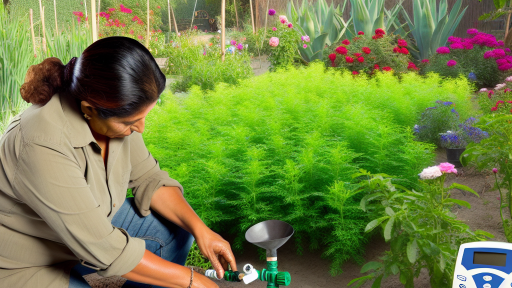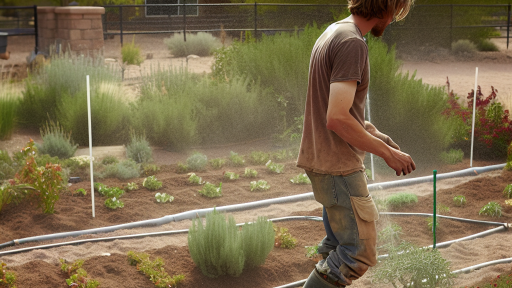Introduction to Organic Pest Control in Container Farms
Container farming presents unique challenges for pest control.
Maintaining a healthy ecosystem is crucial for success.
Organic pest control methods offer sustainable solutions.
Farmers can effectively manage pests without harmful chemicals.
This section will explore various organic approaches.
Understanding Organic Pest Control
Organic pest control relies on natural methods and materials.
It focuses on prevention and intervention strategies.
Examples include using beneficial insects and plant barriers.
Farmers should prioritize non-toxic solutions for their crops.
Benefits of Organic Pest Control
Organic pest management enhances crop health and yield.
It minimizes environmental impact and promotes biodiversity.
Additionally, it can improve soil quality over time.
Farmers also enjoy increased consumer preference for organic produce.
Implementing Organic Strategies
Successful implementation requires planning and monitoring.
Farmers should observe their crops regularly for signs of pests.
Transform Your Agribusiness
Unlock your farm's potential with expert advice tailored to your needs. Get actionable steps that drive real results.
Get StartedIt’s essential to identify pests accurately before treatment.
Using an integrated pest management approach is recommended.
Benefits of Organic Pest Control Methods
Environmental Health
Organic pest control methods significantly reduce chemical pollution.
They promote healthier ecosystems and biodiversity.
Furthermore, these methods protect water quality and soil health.
Safety for Humans and Animals
Organic pest control reduces the risk of pesticide exposure.
This leads to safer produce for consumers and a healthier environment.
Additionally, it minimizes risks to non-target species, including pets and wildlife.
Long-term Viability
Using organic methods helps maintain pest control effectiveness over time.
With reduced resistance buildup, pests remain manageable.
Moreover, organic practices contribute to soil fertility and crop resilience.
Economic Benefits
Organic pest control can lower input costs in the long run.
Farmers can save money on expensive chemical treatments.
Additionally, organic produce often fetches higher market prices.
Consumer Demand
There is a growing consumer preference for organic products.
This shift leads to increased market opportunities for farmers.
Also, organic methods can enhance a farm’s reputation for sustainability.
Common Pests in Container Farms and Their Impact
Identifying Common Pests
Container farms often attract various pests.
Common pests include aphids, spider mites, and whiteflies.
These insects can wreak havoc on your crops.
Additionally, fungus gnats and thrips pose threats.
Early identification helps manage these pests effectively.
Impact of Pests on Crops
Pests can cause significant damage to plants.
Aphids, for example, suck sap from leaves.
Showcase Your Farming Business
Publish your professional farming services profile on our blog for a one-time fee of $200 and reach a dedicated audience of farmers and agribusiness owners.
Publish Your ProfileThis leads to reduced growth and leaf wilting.
Spider mites leave behind fine webs, indicating their presence.
They can cause leaf discoloration and drop.
Whiteflies can transmit diseases among plants.
Consequently, your crop yield may decline.
Fungus gnats disrupt root health, leading to plant stress.
Thrips can damage flowers and fruits directly.
Recognizing Symptoms of Infestation
Identifying symptoms of pest infestation is crucial.
Look for curling leaves or yellowing foliage.
Small webs on plants often indicate spider mites.
Check for sticky residue, a sign of aphid activity.
Black sooty mold may develop from honeydew excreted by aphids.
Focus on early intervention to minimize impact.
Proactive Pest Management Strategies
Implementing preventive measures can deter pests.
Regularly inspecting plants helps detect issues early.
Ensure proper air circulation around your container farm.
Utilizing beneficial insects can naturally control pests.
For example, ladybugs feed on aphids effectively.
Introduce predatory mites to combat spider mite infestations.
Additionally, maintaining clean equipment prevents pest spread.
Explore Further: Pest and Disease Management in Mushroom Farming
Cultural Practices for Preventing Pest Infestations
Crop Rotation
Crop rotation involves changing the type of crops grown in a specific area each season.
This practice disrupts pest life cycles and reduces population densities.
By alternating crops, pests that thrive on specific plants have fewer resources available.
Soil Health Management
Maintaining healthy soil prevents pest issues from arising.
Healthy soil fosters strong plants, which are less susceptible to pests.
Use organic compost and mulches to enhance soil quality and structure.
Water Management
Proper watering techniques help minimize pest infestations.
Avoid overwatering to prevent creating a suitable environment for pests.
Drip irrigation targets the root zone and limits surface moisture.
Sanitation Practices
Keeping the growing area clean is critical for pest management.
Remove plant debris and fallen fruits that attract pests.
Regularly inspect plants for any signs of pest activity or damage.
Companion Planting
Companion planting pairs different plants to deter pests naturally.
Certain plants can repel harmful insects or attract beneficial predators.
For instance, marigolds can deter nematodes and other pests.
Use of Natural Barriers
Natural barriers can effectively shield plants from pests.
Use row covers to protect crops from insect damage.
Planting physical barriers like garlic or chives can discourage pests, too.
You Might Also Like: Seasonal Planting Guides for Organic Farmers
Showcase Your Farming Business
Publish your professional farming services profile on our blog for a one-time fee of $200 and reach a dedicated audience of farmers and agribusiness owners.
Publish Your ProfileBiological Control: Utilizing Natural Predators and Parasites
Understanding Biological Control
Biological control involves using living organisms to manage pests.
Natural predators, such as ladybugs and lacewings, help control pest populations.
Parasites, like wasps, lay eggs in or on pest species.
This method reduces reliance on chemical pesticides.
Benefits of Biological Control
One significant benefit is environmental safety.
Biological methods typically pose less risk to non-target organisms.
Moreover, they promote biodiversity within the farm ecosystem.
Additionally, biological control often results in cost savings over time.
Selecting Appropriate Natural Predators
Choosing the right natural predators is crucial for effectiveness.
Research the pests that commonly affect your container farm.
Identify predators that specifically target those pest species.
For example, if aphids are a problem, introduce ladybugs.
Implementing Parasite-Based Control
Parasite introduction requires careful monitoring.
Ensure the selected parasites are effective against the target pests.
Release them at appropriate intervals for optimal results.
For instance, nematodes can be used to control soil-dwelling larvae.
Monitoring and Maintenance
After introducing predators or parasites, consistent monitoring is necessary.
Check pest populations regularly to assess control effectiveness.
Adjust strategies based on observed results and environmental changes.
Integrating Biological Control with Other Methods
Biological control works best when integrated with other pest management strategies.
Consider cultural practices, like crop rotation, to enhance effectiveness.
Combining methods leads to more sustainable pest management.
Moreover, this integrated approach helps maintain a healthy ecosystem.
You Might Also Like: Integrating Livestock into Organic Farming Systems
Botanical Insecticides: Safe Alternatives for Pest Management
Introduction to Botanical Insecticides
Botanical insecticides are derived from plants and offer a natural pest control option.
These substances are often less harmful than synthetic alternatives.
Utilizing botanical insecticides can enhance the sustainability of container farms.
Common Types of Botanical Insecticides
Several types of botanical insecticides are available in the market.
Neem oil is one of the most renowned options.
This oil disrupts insect hormones, limiting their growth and reproduction.
Pyrethrin is another popular choice, derived from chrysanthemum flowers.
It paralyzes insects, providing quick results against pest infestations.
Bacillus thuringiensis (Bt) is a bacterial insecticide targeting specific pests.
It can effectively control caterpillars without harming beneficial insects.
Application and Usage
Applying botanical insecticides requires careful attention to timing and methods.
Reapply these products frequently, especially after rain.
Target the pests directly for optimal effectiveness.
Utilize proper protective gear during application for safety.
Always follow the manufacturer’s instructions for best results.
Benefits of Using Botanical Insecticides
Using botanical insecticides promotes a healthier growing environment.
Showcase Your Farming Business
Publish your professional farming services profile on our blog for a one-time fee of $200 and reach a dedicated audience of farmers and agribusiness owners.
Publish Your ProfileThey are generally safer for bees and other pollinators.
Moreover, they can be used in conjunction with organic farming practices.
Additionally, these products often break down quickly in the environment.
As a result, they reduce the risk of long-term soil contamination.
Potential Drawbacks to Consider
While botanical insecticides are beneficial, they come with some drawbacks.
They may not provide as fast results as synthetic pesticides.
Furthermore, effectiveness can vary depending on pest species.
Some users may find they require more frequent applications.
Botanical Insecticides as a Sustainable Solution
Botanical insecticides are a valuable tool in sustainable pest management.
They offer effective control while minimizing harm to the ecosystem.
By integrating these products into their pest management strategy, container farmers can enhance their organic practices.
See Related Content: Climate Resilient Practices in Organic Agriculture

Companion Planting Techniques to Deter Pests
Basics of Companion Planting
Companion planting involves pairing different plants for mutual benefits.
This technique naturally deters pests and enhances growth.
Furthermore, it creates a harmonious ecosystem within container farms.
Common Companion Plant Pairings
Some plants work well together and fend off pests effectively.
- Marigolds repel nematodes and various insects.
- Chives deter aphids and Japanese beetles.
- Basil enhances the growth of tomatoes while repelling flies.
These pairings can significantly enhance pest control.
Utilizing Scent and Flavor
Strong scents can confuse and repel pests.
Planting herbs alongside vegetables can be beneficial.
For instance, dill attracts ladybugs, which prey on harmful pests.
Similarly, mint can deter ants and aphids when planted strategically.
Encouraging Beneficial Insects
Some companion plants attract beneficial insects to your container farm.
For example, planting yarrow can attract predatory wasps.
These wasps target pests like caterpillars, providing natural pest control.
Rotation and Diversity
Rotating companions helps break pest cycles.
This practice encourages soil health and reduces plant stress.
Additionally, diversifying plant types enhances resilience against outbreaks.
Monitoring and Identifying Pests
Importance of Regular Monitoring
Regular monitoring is essential for effective pest management.
It helps in detecting pests before they cause significant damage.
Early identification allows for timely intervention.
Moreover, it reduces the reliance on chemical pesticides.
Tools for Monitoring
Use simple tools for effective pest monitoring.
- Sticky traps can capture flying pests.
- Hand lenses help in closely examining plants.
- Field journals enable recording pest activity.
Additionally, digital tools enhance your monitoring efforts.
Mobile apps can track pest sightings and outbreaks.
Identifying Pest Types
Identifying the type of pest is crucial for effective control.
Use resources like extension services and online databases.
Insect identification apps can assist in this task.
Consider attending local workshops for hands-on experience.
Indicators of Pest Infestation
Look for visible signs of infestation on plants.
- Chewed leaves indicate herbivore pests.
- Discoloration may signal fungal infections.
- Webbing often suggests spider mite presence.
Regular inspections help in noticing these signs early.
Showcase Your Farming Business
Publish your professional farming services profile on our blog for a one-time fee of $200 and reach a dedicated audience of farmers and agribusiness owners.
Publish Your ProfileImportance of Accurate Identification
Correctly identifying pests allows for targeted control measures.
It minimizes harm to beneficial insects and the environment.
By understanding pest life cycles, you can time interventions effectively.
Integrating Organic Pest Control with Container Farming Practices
Benefits of Organic Pest Control
Organic pest control methods enhance the sustainability of container farming.
These methods reduce chemical residues on produce.
Moreover, they promote biodiversity in the farming ecosystem.
Common Organic Pest Control Methods
Many effective organic pest control methods exist for container farming.
Firstly, introducing beneficial insects can help manage pest populations.
For instance, ladybugs and lacewings prey on aphids.
Additionally, using neem oil can deter a variety of pests.
This natural pesticide disrupts the life cycle of insects.
Companion Planting Techniques
Companion planting can also provide natural pest control in container farms.
Some plants repel pests while others attract beneficial insects.
For example, marigolds deter nematodes and other harmful insects.
Similarly, basil can enhance the growth and taste of surrounding plants.
Regular Crop Rotation
Implementing regular crop rotation is essential for organic pest management.
This practice disrupts pest life cycles and reduces infestations.
Furthermore, rotating crops improves soil health and fertility.
Monitoring and Identification
Monitoring pest populations is crucial for effective organic control.
Regular inspections help identify problems before they escalate.
Utilizing sticky traps can aid in tracking insect activity.
Utilizing Organic Mulches
Organic mulches contribute to pest control in multiple ways.
They suppress weeds and retain soil moisture.
Moreover, mulches can harbor beneficial insects and deter harmful ones.
Creating a Diverse Environment
Diversity in plant life fosters a balanced ecosystem in container farms.
Planting a variety of species can confuse pests and reduce their numbers.
Including flowering plants attracts pollinators and beneficial insects.
Harnessing Natural Repellents
Natural repellents can effectively keep pests at bay.
Examples include garlic sprays and chili pepper solutions.
These mixtures are simple to prepare and environmentally friendly.
Education and Community Involvement
Educating farmers about organic pest control increases effectiveness.
Community workshops can share successful strategies and experiences.
Collaboration within the farming community fosters innovation.
Case Studies: Successful Implementation of Organic Pest Control
Urban Growers Collective
The Urban Growers Collective in Chicago successfully integrates organic pest control methods.
They focus on preventative measures to enhance plant health.
This approach helps them maintain a balanced ecosystem in container farms.
Moreover, they use beneficial insects like ladybugs to manage aphids.
This method effectively reduces pest populations while supporting biodiversity.
Sunshine Hydroponics
Sunshine Hydroponics, located in California, emphasizes companion planting.
They grow marigolds alongside vegetables to deter nematodes and whiteflies.
Showcase Your Farming Business
Publish your professional farming services profile on our blog for a one-time fee of $200 and reach a dedicated audience of farmers and agribusiness owners.
Publish Your ProfileThis integrated strategy fosters a healthier environment for crops.
As a result, they’ve seen a significant decrease in pest-related issues.
Furthermore, they employ neem oil sprays as a targeted organic solution.
Green Horizons
Green Horizons in Oregon utilizes homemade insecticidal soaps.
They create solutions from natural plant oils to target soft-bodied pests.
This practice avoids chemical residues and promotes public health.
The farmers have successfully reduced infestations without harming beneficial insects.
In addition, they routinely monitor pest populations to fine-tune their methods.
Kitchen Gardeners International
Kitchen Gardeners International focuses on educating urban farmers.
Their workshops teach organic pest management techniques.
Participants learn about biodiversity enhancement and habitat restoration.
This knowledge empowers local growers to control pests organically.
Many members report improved harvests and reduced pest issues over time.




